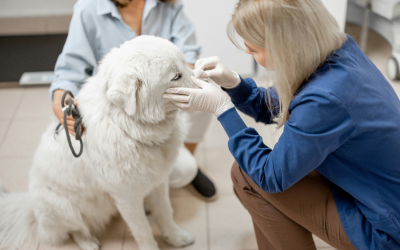Lyme disease is a significant concern for both humans and animals, particularly dogs. Caused by the bacterium Borrelia burgdorferi and transmitted through the bite of infected black-legged ticks (commonly known as deer ticks), Lyme disease is prevalent in many parts of the United States, including our region. While preventable, the disease can lead to chronic health issues if left untreated or undiagnosed, making awareness and proactive care essential for pet owners.
Pets contract Lyme disease when bitten by an infected tick. These ticks thrive in wooded, grassy, and brushy areas, making outdoor spaces a potential risk zone for adventurous pets. Once infected, the signs of Lyme disease may not appear immediately. In fact, symptoms can emerge weeks or even months after the tick bite, making it challenging to link the illness to the initial exposure. Common symptoms include lameness that shifts between legs, swollen joints, stiffness, fatigue, fever, loss of appetite, and swollen lymph nodes. In severe cases, Lyme disease can lead to life-threatening complications, such as kidney failure (Lyme nephritis), heart issues, or neurological problems.
When a pet tests positive for Lyme disease, it doesn’t always mean active illness. According to the Companion Animal Parasite Council (CAPC), a positive test result indicates exposure to Borrelia burgdorferi, but not all exposed pets develop clinical symptoms. This distinction is crucial in determining the appropriate course of action. CAPC emphasizes that treatment should be reserved for pets showing signs of active infection or those with diagnostic evidence of complications. Unnecessary treatments, such as antibiotics for asymptomatic pets, are discouraged to avoid medication resistance and other potential side effects.
For pets with active Lyme disease, treatment typically involves a course of antibiotics, such as doxycycline, for at least 30 days. Anti-inflammatory medications may be prescribed to address joint pain or swelling. However, for pets that have tested positive for Lyme disease over a long period, the approach shifts to monitoring and managing potential long-term effects. Chronic positive results can indicate lingering antibodies from past exposure rather than ongoing infection. In these cases, veterinarians focus on regular health evaluations and monitoring for complications rather than automatically resorting to antibiotics.
One of the most concerning complications of Lyme disease is Lyme nephritis, a condition that affects the kidneys and can be life-threatening. To screen for this, veterinarians often recommend urine protein tests to detect protein-losing nephropathy, a hallmark of kidney damage. Early detection of such complications allows for timely interventions, which may include dietary changes, medications, or other supportive therapies.
Preventing Lyme disease is far more effective—and less stressful—than treating it. CAPC provides clear recommendations for reducing the risk of Lyme disease in pets. Year-round tick prevention is the cornerstone of protection. Products such as topical treatments, oral medications, or tick collars can effectively repel and kill ticks before they transmit the disease. It’s important to use veterinarian-recommended products, as some over-the-counter options may be less effective or even unsafe.
Vaccination is another valuable tool in preventing Lyme disease. While not all dogs require the Lyme vaccine, it can provide an added layer of protection for pets in high-risk areas or those with frequent outdoor exposure. Discuss with your veterinarian whether the vaccine is appropriate for your pet based on their lifestyle and risk factors.
In addition to medical prevention, environmental control plays a critical role. Keeping your yard well-maintained by mowing grass, removing leaf litter, and creating barriers between wooded areas and your property can help reduce tick habitats. After outdoor activities, it’s essential to perform thorough tick checks on your pet, paying close attention to areas like the ears, neck, underbelly, and between the toes. If a tick is found, it should be removed promptly and carefully using tweezers or a tick-removal tool. Avoid crushing the tick, as this can increase the risk of infection.
For pets with a history of Lyme disease, regular veterinary check-ups are vital. Even if a pet appears healthy, ongoing monitoring allows veterinarians to detect subtle changes that could indicate complications. Blood tests, urine analysis, and other diagnostics are often part of the routine care for pets with chronic positive Lyme results. This proactive approach ensures that any emerging issues are addressed early, improving the pet’s quality of life.
It’s also important to recognize that some pets may experience lingering effects of Lyme disease, even after treatment. Known as “post-treatment Lyme disease syndrome,” these symptoms can include fatigue, joint pain, or stiffness. While the exact cause of this syndrome is not fully understood, it underscores the importance of ongoing care and symptom management for affected pets. Veterinarians may recommend additional therapies, such as joint supplements, pain management plans, or physical rehabilitation, to support pets with chronic symptoms.
As a pet owner, your role in preventing and managing Lyme disease is crucial. Awareness and vigilance can make all the difference in your pet’s health. Prevention is far less costly—both emotionally and financially—than treating the disease. By following CAPC’s guidelines and working closely with your veterinarian, you can protect your pet from the risks of Lyme disease and ensure they live a happy, healthy life.
At Guardian Animal Medical Center, we are committed to providing the highest standard of care for your pets. Whether it’s discussing prevention options, diagnosing Lyme disease, or managing long-term conditions, our team is here to support you every step of the way. If you have concerns about Lyme disease or want to schedule an appointment, don’t hesitate to reach out to us. Together, we can ensure your furry family members are safe from preventable illnesses like Lyme disease.
For more information or to schedule an appointment, visit www.GuardianAnimal.com or call us at 606-928-6566. Prevention and proactive care are the best defenses against Lyme disease—let’s work together to keep your pets healthy and thriving.

